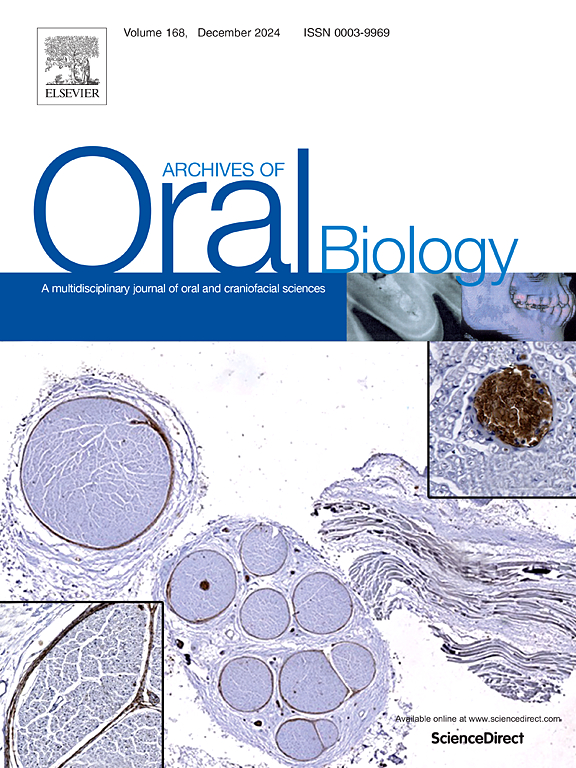口腔微生物群失调与干燥综合征的关系。临床研究的系统回顾。
IF 2.2
4区 医学
Q2 DENTISTRY, ORAL SURGERY & MEDICINE
引用次数: 0
摘要
目的:本系统综述探讨口腔微生物群失调与干燥综合征(SS)的关系。材料与方法:独立检索PubMed/Medline、EMBASE、OVID、Web of Science、Scopus等索引数据库,检索截止到2024年8月发表的相关手稿。纳入SS患者口腔微生物菌群计数及多样性的临床研究。使用非随机干预研究的偏倚风险工具对个体研究进行偏倚风险评估。结果:在最初的295项研究中,有15项临床研究符合选择标准。这些研究的方案相似,但在SS的诊断标准、唾液流量估计方法、牙齿和牙周状态发现以及观察到的口腔微生物类型方面有所不同。在15项研究中,14项研究显示SS患者口腔微生物组的改变和微生物多样性的差异。据报道,SS患者口腔中普雷沃氏菌、细络菌和厚壁菌门的微生物数量较高,而与龋齿相关的链球菌、乳酸杆菌和细络菌的患病率较高。总的来说,这些研究的偏倚风险较低。结论:本综述的研究结果表明,与健康受试者相比,SS患者存在明显的口腔微生物失调和微生物多样性差异。未来需要精心设计的纵向研究来验证结果。本文章由计算机程序翻译,如有差异,请以英文原文为准。
Association between oral microbiome dysbiosis and Sjogren Syndrome. A systematic review of clinical studies
Objectives
This systematic review investigates the association of oral microbiome dysbiosis with Sjogren Syndrome (SS).
Materials and methods
Indexed databases (PubMed/Medline, EMBASE, OVID, Web of Science, and Scopus) were independently searched for relevant manuscripts published until August 2024. Clinical studies on oral microbial flora count and diversity in SS patients were included. Risk of bias across individual studies was performed using the Risk of Bias in Nonrandomized Studies of Interventions tool.
Results
Out of the initial 295 studies, 15 clinical studies met the selection criteria. The protocols were similar across the studies but varied in diagnostic criteria for SS, salivary flow estimation methods, dental and periodontal status findings, and the type of oral microbes observed. Out of 15 studies, 14 showed an alteration in the oral microbiome and differences in microbial diversity in SS patients. Higher oral microbial counts of Prevotella, Viellonella, and Firmicutes in SS were reported, whereas a higher prevalence of caries-associated bacteria Streptococcus, Lactobacillus, and Viellonella was found in SS patients. Overall, the studies had a low risk of bias.
Conclusions
The findings of the present review have shown the existence of significant oral microbial dysbiosis and differences in microbial diversity in SS patients compared to healthy subjects. Future well-designed longitudinal studies are needed to validate the results.
求助全文
通过发布文献求助,成功后即可免费获取论文全文。
去求助
来源期刊

Archives of oral biology
医学-牙科与口腔外科
CiteScore
5.10
自引率
3.30%
发文量
177
审稿时长
26 days
期刊介绍:
Archives of Oral Biology is an international journal which aims to publish papers of the highest scientific quality in the oral and craniofacial sciences. The journal is particularly interested in research which advances knowledge in the mechanisms of craniofacial development and disease, including:
Cell and molecular biology
Molecular genetics
Immunology
Pathogenesis
Cellular microbiology
Embryology
Syndromology
Forensic dentistry
 求助内容:
求助内容: 应助结果提醒方式:
应助结果提醒方式:


